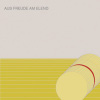 After having explored the experimental possibilities inherent in the grand piano on his 1986 album Notturno, Tietchens visited the human voice on the 1988 follow up Aus Freude Am Elend. On it, this musical innovator raids recordings of religious ecstatics, people shouting and making love, people singing, and others, using these ‘stolen’ voices to create new frameworks, decontextualised and deconstructed, and in the process rendering the human voice as richly complex an instrument as any woodwind or stringed example. Under Tietchens' analytical gaze and craftsmanlike manipulation, we are left with something that is at once familiar and exotically alien, a veritable menagerie of species paraded before the gaze and designed to both appal and enthral equally.
After having explored the experimental possibilities inherent in the grand piano on his 1986 album Notturno, Tietchens visited the human voice on the 1988 follow up Aus Freude Am Elend. On it, this musical innovator raids recordings of religious ecstatics, people shouting and making love, people singing, and others, using these ‘stolen’ voices to create new frameworks, decontextualised and deconstructed, and in the process rendering the human voice as richly complex an instrument as any woodwind or stringed example. Under Tietchens' analytical gaze and craftsmanlike manipulation, we are left with something that is at once familiar and exotically alien, a veritable menagerie of species paraded before the gaze and designed to both appal and enthral equally.
The practice and techniques of plunderphonics were nothing new, even back then in the late '80a. The genre had been around since early in the same decade, but never one to sit back and regurgitate what had gone before, Tietchens’ mission was (and still is) constantly to challenge ideas about what music is and could be, even new ones. Consequently (and make no mistake about this), this is one of the most challenging and difficult works so far released in the Die Stadt reissue series of his works. Unlike previous albums, there is very little in the way of recognizable music; instead it’s all created using loops alongside both treated and untreated voices. At one and the same time, there’s a mixture of the warm and natural along with the cold and clinical, as well as a sense that the music is both pleasantly inviting and yet simultaneously repellent.
Surprisingly for what some would see as fairly sterile and intellectual music, perhaps, these tracks elicit quite a broad range of reactions. “Den Stiftsherren,” for starters, is formed from a piece of choral singing but here it’s been imbued with a disturbing air of soiled holiness, the slightly atonal configuration of the singing often jarring and more than disconcerting. It is as if the constant warring of good and evil is fighting for the very soul of the piece. A more ritualistic and decidedly tribally pagan piece cheekily follows on from that in “Negus,” a driving rhythm propelling wordless shouts and grunts, lending it a somewhat purer spiritual primitivism to it that is positively uplifting. To my mind, the juxtaposition of these two tracks hardly seems coincidental, as it seems the philosophical contrast between them is deliberately being pointed up—on the one hand corrupted sanctity and on the other unspoilt spirituality.
As a further example, the track called “Rosenkranz” follows a similar tack, the difference here I felt being that the argument was more to do with ‘primitive’ vs. ‘modern.’ Unaccompanied childlike singing voices, signalling the untouched world, eventually get tainted by the sphere of modern technology, as the piece alternates between untreated and treated voices. Those pure unpolluted tones turn into nasty, clanky, mechanically buzzing electronic insects, a sure metaphor for the slow degradation of so-called ‘primitive’ societies that technology inevitably brings along in its wake.
This, for me, is the soul of the album, the dichotomies and tensions thrown up by the natural versus the modern, and maybe by extension the clash of civilisations and peoples. As never before at any time in history, such tensions and divisions are boiling to the surface. Indeed, as I was listening to this, a whole raft of ideas occurred to me as to what meaning it all held. The plain truth is probably that it has no meaning other than what people bring to it, but it certainly sparked off ideas of opposition, the tension between systems, whether technological, social, or political. The very nature of the material being used and its treatment suggests those frictions and contradictions inherent in every aspect of life and society. The very fact that this album was created two decades ago emphasises its timelessness in that respect. Out of all the albums recorded by Tietchens that I have heard, this has probably been the most rewarding, both intellectually and musically. Apart from any other consideration, it just goes to show how innovative and forward-thinking this artist was, and continues to be even today.
Samples:
Read More

